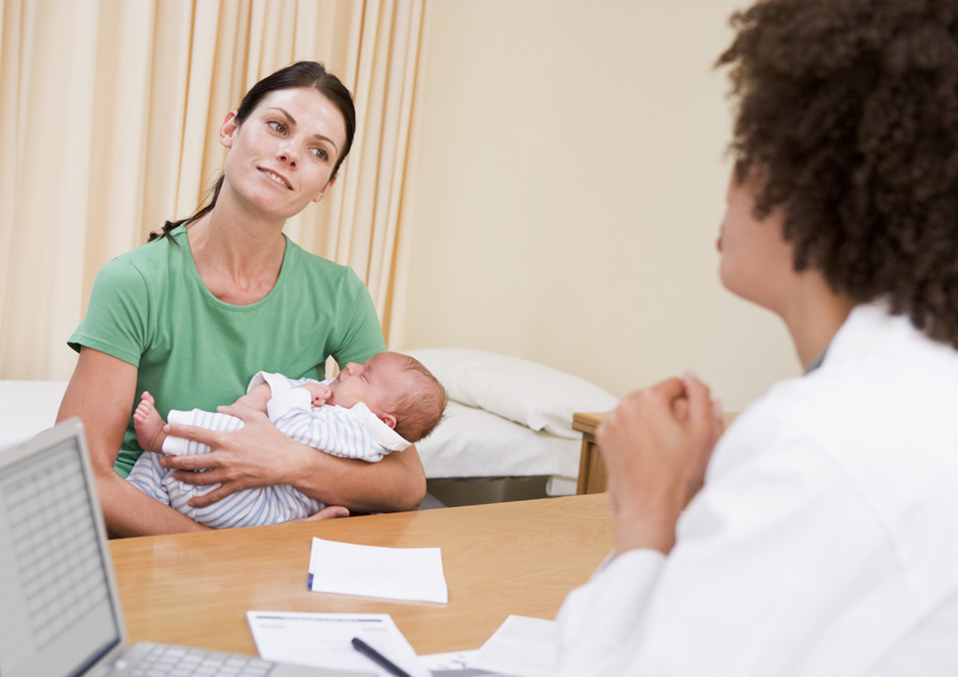A total of 20 compulsory examinations ensure the health, good growth and psychomotor development of toddlers. Regular surveillance has key ages for effective prevention.
What Are The Mandatory Medical Examinations For Babies?
During the first six years; our baby will experience significant growth; but at this age, it is also more fragile. Regular medical follow-up is important to ensure that your baby’s health is maintained. “During these key appointments; it is better to choose a pediatrician or in any case a professional who has the habit of following the youngest,” advises Dr. Brigitte Virey. Because according to age; there are particular tests to be carried out. »
The doctor is not only interested in the medical side; he also ensures good psychomotor development, linguistic abilities.
And since these visits last about thirty minutes; we take the opportunity to ask all the questions that concern us concerning his diet, his sleep, his hygiene… good to know: they are reimbursed 100 % by the Health Insurance.
0-6 Months, Close Monitoring:

From the moment of birth, our baby is examined under the microscope by the mother’s pediatrician to assess his state of Health (breathing, heart rate, etc.), to detect possible malformations or abnormalities (hip dislocation, congenital torticollis, jaundice…).
Then, another even more extensive medical appointment is planned before the return home. This is the famous “test of the 8th day” during which the pediatrician does a complete check-up (neurological examination, verification of vision and hearing…). A blood test (the Guthrie test) can also be performed to detect five diseases; including cystic fibrosis and hypothyroidism.
In practice, however, because of the increasingly early exits; this examination; known as the 8th day; is in fact carried out around the 2nd or 3rd day. “It’s a little too early,” notes Dr. Brigitte Virey, ” because some heart defects are not yet detectable.
Similarly, infections may appear later and jaundice may worsen in the next few days. ”In order to avoid missing out on certain pathologies; the high health authority (HAS) recommends that children who leave the maternity hospital early undergo a medical examination between the 6th and the 10th day after their birth. An examination during the 2nd week of the life of the infant is also required.
Read Also:
Then, during its first six months, the baby must have a monthly medical examination.
Each time; it will be performed according to the same ritual. The Doctor Weighs it and measures it to plot its growth curve.
It also controls muscle tone, motor, and sensory development, vision, and hearing.
He makes the vaccines. Besides, so that our baby doesn’t have too much pain during the injection, we can give him the Breast, his bottle or his pacifier. Many studies show that sucking on the toddler or distraction on the toddler helps to reduce pain. Anesthetic patches, to be applied in advance, can also be used in Doctor’s instructions.
6-12 Months, a Follow-Up Every Three Months:

For this age group, three visits are mandatory – at 6, 9 and 12 months – and they take place in the same way as the previous ones: weight gain and height, psychomotor control… but there are nevertheless some peculiarities depending on the age.
The 9th Month visit is important because the doctor completes a health certificate to be given to PMI services (this certificate can be found in the health care that was given to us at the Maternity Hospital). It is a logbook in which are kept all the information related to our baby’s Health (size, vaccines, particular diseases…). A valuable tool that allows a healthcare professional, who has never seen our baby before, to quickly know his medical history. It is, therefore, better to take your health card with you every time you go on holiday, or if you give it to your grandparents for a few days.
During this 9th month appointment, the doctor pays more attention to auditory and visual screening. Using simple tests and materials such as the “Sensory baby-test”, for example, he observes the baby’s reactions to listening to severe and acute sounds. If there’s a suspicion of hearing impairment, she’ll refer us to a specialist. It is also one of the benefits of regular follow-up: detect disorders as early as possible to better treat them. As for the 12-month visit, it is more focused on linguistic skills (the baby starts to interact by speaking a few words like ” Mom ” or ” dad “) and motor skills, because he is in the middle of getting to walk, it is necessary to make sure that he does not limp.
1 Year-2 Year, Visits Every Four Months:
Past his first birthday, you space a few control visits. Medical appointments are set at 16, 20 and 24 months. There is always a clinical examination (weight, height…), we discuss the questions of sleep, diet… it is also the opportunity to practice the different injections of vaccines at the ages recommended by the vaccination schedule.
The pediatrician also ensures good psychomotor development. At 16 months, for example, the step must be properly installed. At 20 months, he must be able to climb the stairs… likewise, language is at the center of attention during these medical visits. Then, at the time of the appointment of his 24 months, the doctor again completes a health certificate which must be given to the maternal and Baby protection (PMI), as during the visit of the 9 months.
In addition, it conducts extensive auditory and visual screening. And he insists on putting in place a toothbrushing twice a day. He also ensures his psychomotor development (can he Name images ? Does he Associate two words ?)etc.
After 2 Years, Two Annual Appointments:

During this period, monitoring visits may take place every 6 months. There is always a clinical examination and then there is a need to target certain points based on age. First of all, the visit to the 3-year-olds is often done just before the entrance to kindergarten.
It is ideal to take stock of the baby’s socializing abilities, to appreciate his or her autonomy (is it clean ? can he dress himself ? and so on); his language, his sight, and his hearing.
The doctor tests his fine motor skills by making him unscrew and screw a cap, draw a closed circle, build a tower of 8 cubes, a bridge of 3 cubes, as well as his overall motor skills (can he ride a tricycle ? Jump on one foot ?).
Finally, it calculates the body mass index (BMI) to detect excess weight, underweight or stunting, and plots it on the health record.
This calculation should be repeated at least once a year. Another important assessment is that of the 4-year-olds.
It focuses on auditory screening and a language test (ERTL4), which makes it possible to take stock of linguistic abilities (pronunciation, vocabulary, memorization).
Finally, the last Must-See visit: the one made just before entering the CP, usually around the age of 5 and a half.
The pediatrician carries out another language test (ERTL6) to assess the baby’s abilities to acquire reading; mathematics, his abilities to digitize; his graphics…
Read Also:
In principle; as soon as the toddler is in school; these visits can be carried out within the nursery school by the services of the PMI; usually a nurse.
But in fact, very few cities offer them. “And in any case, if this examination is not done by a doctor; they will have to be completed by the pediatrician,” says Dr. Virey.
Parents then make an appointment with a city doctor of key ages.
In addition, if up to the age of 6; French children receive a good medical follow-up; then things get complicated.
Medical examinations are no longer compulsory and are therefore no longer 100% reimbursed by the health insurance.
“Unlike other European countries, where we continue to maintain an annual or biennial visit throughout childhood”; adds the pediatrician.
Follow-Up Baby’s Health: So That Visits Go Well:
We explain to our baby that he is going to be weighed and measured; that he is going to have a vaccine; that the doctor is going to use different devices to control his sight; his hearing.
So that he gets in the mood; we read him a book featuring his favorite hero who is just going to the doctor. And we avoid phrases like “Don’t be afraid” or “it doesn’t hurt”; because it gives her something to worry about!
To reassure him; we bring his favorite toy, or a book to keep him occupied and to change his mind. We feed him first and change him if we have to. He’ll feel better and have less reason to be grumpy.
Read Also:
- Baby Troubles Sleeping at Night.
- 15 Reasons Baby Might Not Be Crawling.
- How To Make Your Baby Move: Ways And Solution?


